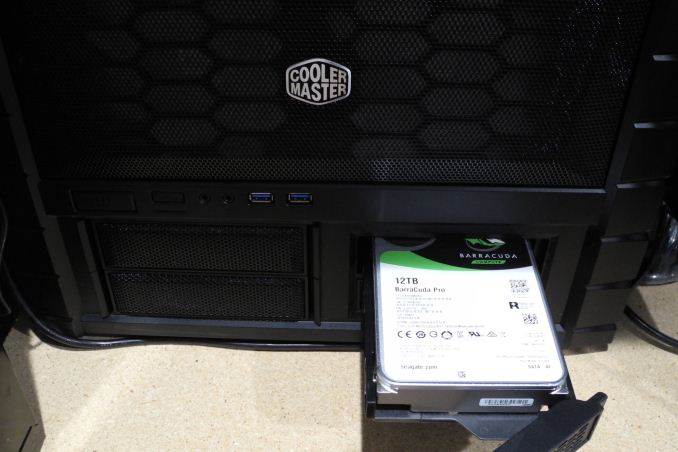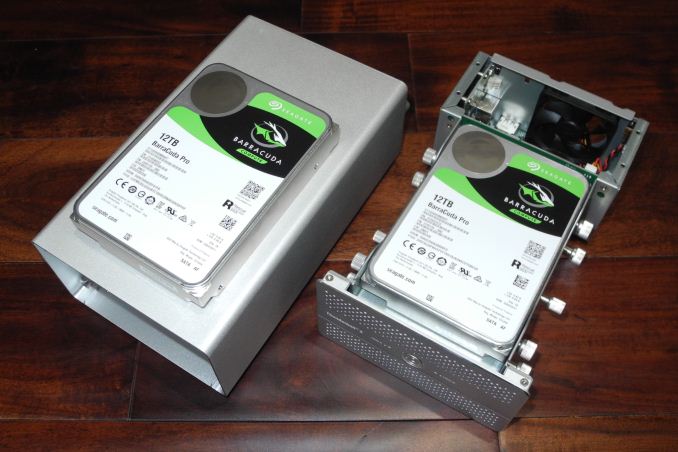Seagate BarraCuda Pro 12TB HDD Review
by Ganesh T S on November 15, 2017 8:00 AM EST- Posted in
- Storage
- Seagate
- HDDs
- Helium HDD
Concluding Remarks
The BarraCuda Pro 12TB is a unique product in the market. It is not often that we see a leading capacity 'desktop-class' hard drive rated for 24x7 operation or workload ratings of 300TB/year. To top it all, Seagate is even throwing in a 5-year warranty. A 2-year data recovery service (DRS) is also included. The lower load/unload cycles rating (300K, compared to the 600K in the equivalent NAS drives) and MTBF (1M hours, compared to 1.2M for the equivalent Pro NAS drive) are slightly disappointing aspects, but, they are more than made up for by the warranty and DRS.
In the gaming desktops market in particular, we are seeing per-game storage requirements running into 100s of GBs, and SSDs continuing to remain above $0.33/GB. Under these circumstances, high-capacity hard drives are bound to become relevant again. In our evaluation, the drive managed to perform quite well for largely sequential workloads (typical of bulk storage requirements in gaming workloads).
Consumers dealing with content creation can also use the BarraCuda Pro as part of a direct-attached storage system. For single-user scenarios, a DAS inherently makes more sense than a NAS. It allows use of enclosures sporting interfaces with higher speeds. The BarraCuda Pro 12TB drive shows great performance in such devices.
In our evaluation, the drive successfully met all of Seagate's claims. Helium drives have achieved economies of scale and are now mass-market devices. The current street price of the BarraCuda Pro 12TB ($500) is already lower than the suggested launch price ($530). The other 12TB Seagate options are the IronWolf NAS drive at $450, IronWolf Pro at $510, and the Enterprise Capacity at $469. We also have the Western Digital WD Gold at $522. The IronWolf has a lower workload rating (180 TB/yr vs 300 TB/yr) and also doesn't have the data recovery service available with the BarraCuda Pro and the IronWolf Pro. None of the enterprise drives carry the DRS option, which justifies the premium associated with the two Seagate Pro drives.
Pricing the BarraCuda Pro mid-point between the IronWolf and the IronWolf Pro would have made it an obvious choice for a high-capacity desktop / DAS usage drive. As it currently stands, it is difficult to choose between the IronWolf Pro and the BarraCuda Pro, as only $10 separates them. The IronWolf Pro also has a higher load/unload cycle rating. Seagate claims that the firmware in the BarraCuda Pro is tuned specifically for typical high-end desktop workloads. However, it is unlikely that consumers will see obvious performance differences between the two drives in typical single-user scenarios. In the end, the DRS ensures that customers are unlikely to go wrong with either the IronWolf Pro or the BarraCuda Pro, irrespective of the end application.












62 Comments
View All Comments
ddrіver - Wednesday, November 15, 2017 - link
"Conventional" magnetic recording is "giant magneto resistor recording". So what you're saying doesn't make sense.takeshi7 - Thursday, November 16, 2017 - link
It makes perfect sense. CMR is how hard drives have stored data on tracks since their inception in the 1950's. SMR is a different strategy for writing the tracks that has the writer overlap with previously written tracks to increase track density."Shingled" magnetic recording is also "giant magneto resistor recording". So that's not a good way to differentiate between them.
ddrіver - Thursday, November 16, 2017 - link
If CMR was the way HDDs worked from the inception then why would you call SMR anything other than that? They're all the same. Magnet. Poles. Everything else is buzzwords the industry is feeding you to make you buy more and more. And the sheeple buy.cm2187 - Wednesday, November 15, 2017 - link
Important question for usage in consumer NAS: how noisy is it?ganeshts - Wednesday, November 15, 2017 - link
All hard drives make noise - particularly if there are lots of random accesses making the heads move around a lot, and I don't think this was any more noisy than other disks that I have evaluated before. Spec sheets put it in the same category as everyone else - 28 dB typical / 30 dB max at idle, 32 dB typical / 34 dB max for performance seeks.To be honest, no one has brought up this aspect before, and I don't think
Ahnilated - Wednesday, November 15, 2017 - link
Do people still buy Seagate's stuff? Their HDD's have a notoriously high level of failure.coburn_c - Wednesday, November 15, 2017 - link
I don't think that's true anymore.haukionkannel - Wednesday, November 15, 2017 - link
Yep, that was a long time ago.Senti - Wednesday, November 15, 2017 - link
Nop, it's still very true. Seagate still holds undisputed first place on HDD failure %.CheapSushi - Thursday, November 16, 2017 - link
I believe that was just mainly for their 3TB or 4TB variants.